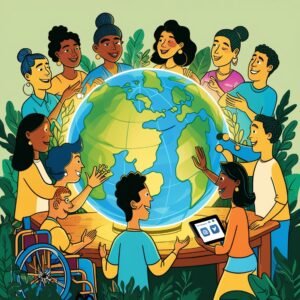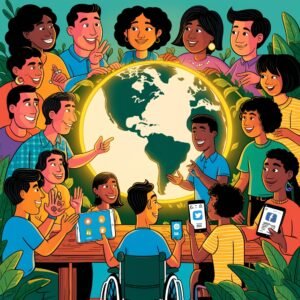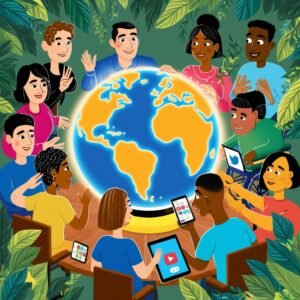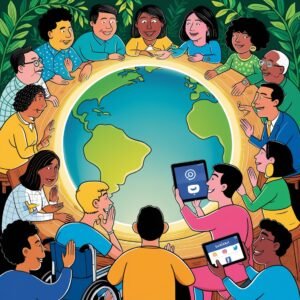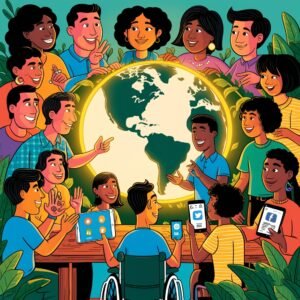💬 Global Awareness + Social Skills
Why Global Awareness and Social Skills Matter More Than Ever
Let’s be real: we’re more connected than ever—online, at work, in school, even in our neighborhoods. But just because the world feels smaller doesn’t mean we always understand each other. That’s where global awareness and social skills come in.
If you’re trying to get ahead at work, collaborate with people from different backgrounds, or just be a better human in a global society, these skills aren’t optional anymore. They’re essential.
So what are we talking about exactly? And how do you get better at them? Let’s break it down.
First, What Is Global Awareness?
Global awareness means having a clue about what’s happening around the world—and caring about it. It’s understanding that your way of life isn’t the only way. Other cultures, perspectives, and challenges exist, and they all matter.
It’s things like:
- Knowing about world news (not just what’s trending locally)
- Understanding how people live and think differently
- Realizing global issues like climate change, inequality, or migration affect all of us
- Being able to think beyond your own bubble
Basically, global awareness means seeing the bigger picture—and your place in it.
And What Are Social Skills?
Social skills are how we connect with other people. Sounds simple, but in practice? It can be tricky—especially when you throw in cultural differences, remote communication, or tense topics.
These skills include:
- Listening (like, really listening)
- Expressing yourself clearly and respectfully
- Reading the room—body language, tone, vibes
- Understanding how others feel (hello, empathy)
- Resolving conflict without blowing up or shutting down
Strong interpersonal skills help you build relationships, avoid awkward misunderstandings, and work better with everyone—no matter where they’re from.
Why These Skills Are So Important Right Now
🌍 The World Is Your Workplace
Whether you’re working remote, managing a global team, or just emailing someone in a different time zone, chances are you’re dealing with different cultures. Cultural intelligence helps you avoid saying or doing the wrong thing—and actually connect.
Example: In some cultures, saying “no” directly is rude. In others, it’s expected. If you don’t get that, things can go sideways fast.
🧑🎓 Classrooms Are Global Too
Today’s students are learning alongside peers from all over. And with study abroad programs, online courses, and international campuses, global exposure is everywhere. Teachers who bring in global perspectives help students grow up more prepared—and more open-minded.
📱 Social Media Isn’t Always Social
We’re all online all the time. But being connected doesn’t guarantee real understanding. Echo chambers, trolling, and culture clashes can make things worse. That’s why global awareness (knowing the context) + social skills (knowing how to talk to people) is the combo we need.
👩💼 Leaders Need People Skills More Than Ever
Managing diverse teams isn’t just about setting goals—it’s about knowing how people think, work, and feel. Great leaders know when to adapt, how to build trust, and how to bring different voices together. That takes emotional intelligence, empathy, and a little humility.
How to Get Better at Global Awareness
1. Follow Global News (Not Just Headlines)
Go beyond your local feed. Try international outlets like BBC, Al Jazeera, or Reuters. Or follow podcasts and creators who give you global insights from different angles.
2. Get Curious About Other Cultures
Watch films, read books, try new foods, or just talk to people from other places. The goal isn’t to become an expert—it’s to stay open and curious. And please: skip the stereotypes.
3. Understand Global Issues
Learn about the big stuff—climate, inequality, health, education, conflict. You don’t have to solve it all. But having a clue means you can talk about it in a way that’s informed, not ignorant.
4. Pick Up a New Language (Even a Little)
Even basic language skills show respect. Plus, they give you a new way of thinking. You’ll also start noticing how culture and communication are deeply connected.
How to Build Stronger Social Skills
1. Listen More, Talk Less
Sounds obvious, but most people are just waiting for their turn to speak. Try actually listening—no interrupting, no jumping to conclusions. Ask follow-up questions. Show you care.
2. Watch Your Nonverbal Cues
Your body language, eye contact, facial expressions, even how fast you speak—all of it matters. And different cultures read these things in different ways. Being aware can avoid major misunderstandings.
3. Don’t Assume—Ask
If something confuses you, don’t fake it or make jokes. Ask questions. Be respectful and genuine. Curiosity is cool. Arrogance? Not so much.
4. Grow Your Emotional Intelligence
Notice how you react under pressure. Can you stay calm? Can you read the room? Are you self-aware? Emotional intelligence is a game-changer—for work, for relationships, for everything.
When Global Awareness Meets Social Skills
These two skills aren’t separate—they work best together.
- You’re in a meeting with an international team and someone doesn’t speak up. Global awareness tells you maybe silence is respectful in their culture. Social skills help you invite them in without putting them on the spot.
- You’re having a heated debate about politics. Global awareness reminds you this issue is more complex than you thought. Social skills help you stay calm and not attack the other person.
- You’re traveling and someone does something totally unfamiliar. Global awareness says, “This is normal for them.” Social skills say, “Let’s be respectful and ask questions instead of judging.”
See how they work hand in hand?
How to Promote These Skills (At Any Age)
For Educators:
- Bring global topics into lessons
- Use group projects to build collaboration and respect
- Model open conversations about tough issues
For Employers:
- Train teams in cultural intelligence
- Encourage diverse voices and leadership styles
- Reward empathy, not just efficiency
For Parents:
- Talk about what’s happening in the world (even if it’s messy)
- Read books or watch shows from different cultures with your kids
- Teach kindness, curiosity, and listening early on
Final Thoughts: It’s Bigger Than You
Here’s the truth: being globally aware and socially skilled doesn’t just help you—it helps everyone around you. It makes work smoother, relationships stronger, and society more compassionate.
You don’t have to be perfect. Just be willing to learn, listen, and lead with empathy.
In a connected world, your global awareness and social skills aren’t “nice extras.” They’re your biggest strengths.
